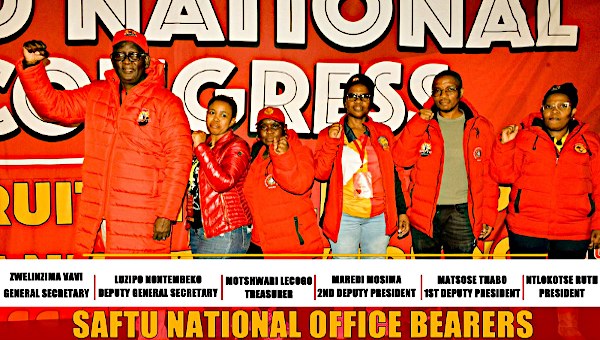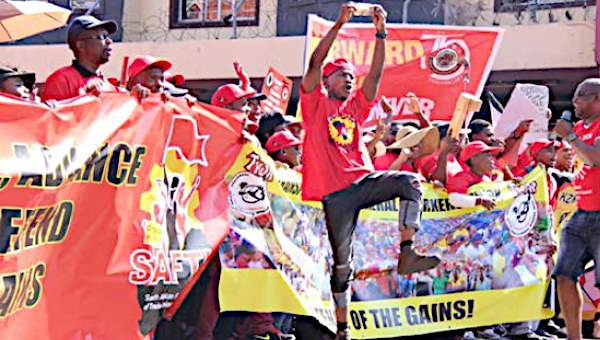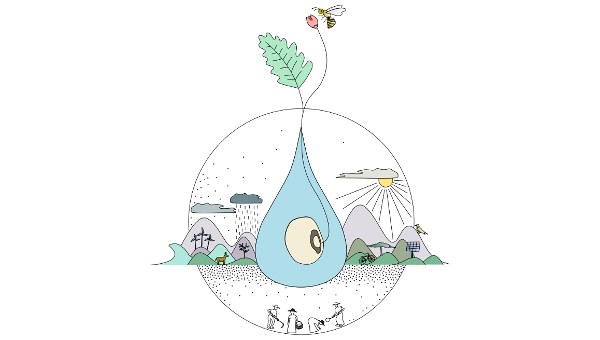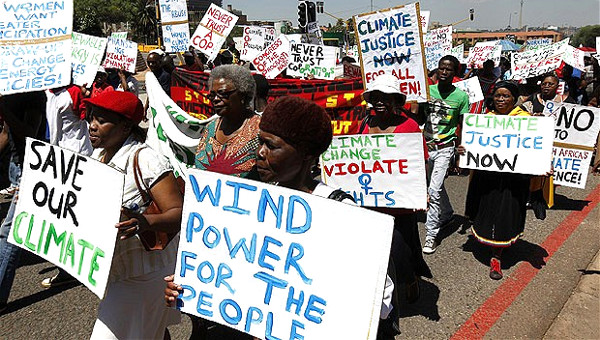Working Class Movement Must Be Independent
A new chapter in the history of the South African working class was opened in Soweto on 21-22 July 2018, when representatives from over 147 South African working-class formations represented by 1000 delegates assembled to unite workplace and community struggles.
It made huge strides forward to lay the foundations for building a new, independent, democratic and militant mass working-class movement to turn the tide against the attacks on jobs and living standards which are pushing more and more South Africans into poverty and despair.
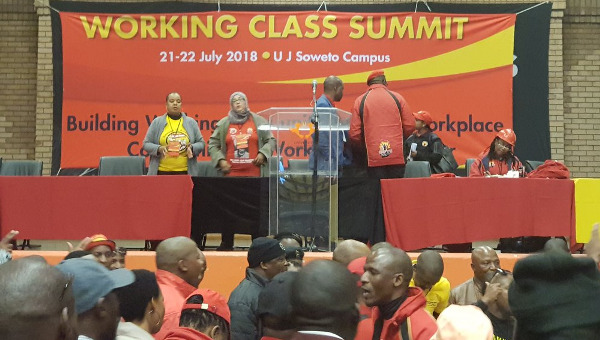
This assembly of the working class, rural poor, the downtrodden and marginalized brought together formations that have never met under the same roof before. It was historic and unprecedented that 147 formations of the working class would meet as equals with mutual respect of one another and in search of a common ground.
This Working Class Summit (WCS) was characterized by a commitment to unite working class formations, the employed and unemployed workers, those in the informal sector and in more secure work, the students and the landless, the homeless and those fighting against the water crisis and the scourge of violence against women and children, into mass campaigns to struggle for a truly free, just, democratic and equal society.
As SAFTU President Mac Chavalala said in his rousing keynote speech:
“As the working class we have been on a junk status for far too long. We are not here to moan but to announce a radical and revolutionary programme that will unite ourselves behind common demands and mass programme of mobilization.
“Our warning to all those who seek to keep the status quo is simple – the holiday is over! From now going forward, we will engage you in the streets and the boardrooms.”
Capitalism is the Common Cause of Our Misery
The Working Class Summit not only endorsed the binding principles around which it will unite such as anti-racism, anti-sexism, anti-patriarchy and anti-xenophobia, but unanimously agreed that capitalism is the common cause of the misery experienced by the majority.
There was unanimous agreement that the working class movement must be independent and adopt a bottom up approach to democracy. In that regard the Working Class Summit agreed to build the working class power in every workplace, in every community and society in general to defeat the logic of capitalist accumulation that has not only pauperized workers across the continent but it has caused the widest inequality and deepest poverty ever recorded in the history of humankind.
It was resolved to convene working class assemblies across the country, in cities and towns, factories and farms, townships and informal settlements to deliberate on how to unite struggles of the poor. South Africa is the protest capital of the world but these struggles have tended to remain localized and movements fragmented. A special appeal was made for trade unionists to become active in these struggles because they are members of communities before they are unionists. In this way, the foundations of the all-important unity of the working class can be established.
The Working Class Summit recognized that the crisis of the system, in which the working class and poor are the primary victims, is caused by capitalism and the policies implemented by the ANC government since 1994. The working class and poor do not have representatives in government. In the 2019 elections, we must have alternatives to the existing parties who govern on behalf of the ruling class. The working class and poor need their own representatives.
The Summit broke into commissions, which debated all the main issues affecting the lives of the majority of our people and adopted a programme to take the struggle forward.
The leadership of all 147 formations who formed part of the Working Class Summit will be convened soon to finalize a programme that will carry forward the decisions of the Summit.
These are the main points from each commission.
1. The Economy, Jobs, Poverty, Inequality and Corruption
The capitalist crisis has deepened since 2008. This marks the failure of neoliberalism implemented since 1980s, including privatization, casualization attacks on labour. Deindustrialization, especially in labour intensive sectors such as textiles, proves that capitalism is not capable of solving the plight of the working class.
Africa has been consigned to the periphery of the international economy, as a provider of primary products – minerals and food.
Thus solidarity across the continent and global south, including BRICS, is essential. But we should not be uncritical in our engagement with BRICS, especially where sub-imperialism is manifest. The Chinese model of development cannot be followed uncritically.
Working-class unity is essential if we are to fight back against this crisis. This unity should be on four main planes of struggle: workplace, ideology, political and social.
Neoliberalism divides workers, which should be overcome through working class solidarity.
It was agreed that we must draw on experiences of the 1980s and work hard to overcome divisions within the revolutionary left, accept unity in diversity and acknowledge existence of different tendencies.
Unemployment is the most pressing condition of the working class. In the short-term we demand:
- Reduction of working hours to share work (possibly a 35hr working week).
- Endorse support for the creation of 5 million jobs over next 5 years.
- Five million young people to be placed in education institutions or internships.
- Oppose recent poverty minimum wage and amendments to labour laws.
- Support the three-day general strike and mass occupation of the main cities.
- Strengthen community struggles.
- Reintroduce the demand for Basic Income Grant.
- Social ownership of land.
2. Free, Quality and Decolonized Education
Education is in crisis. The death of a schoolchild who fell into a pit latrine epitomizes this neglect. Access to education for the working class is not guaranteed.
Thousands of students still cannot register at universities despite the policy of so-called free education.
Quality education remains unequally distributed along social class, racial and spatial lines. Private schools are better resourced and managed. Public schools do not even receive the same amount of resources from the state across provinces, areas and schools.
There is a strong legacy of colonialism in the South African education system, a problem which was highlighted by the #FeesMustFall and #OutsourcingMustFall movements at the universities in 2015 and 2016. The content, curriculum and methods still reflect a past we want to leave behind.
Privatization is not the solution to the crisis of the public education system. We see the proliferation of ‘affordable’ or ‘low cost’ private schools, but the control of education by business or the adoption of business principles in state education leads to the commodification of education. Education must be accessible to all not just to those with the money to pay.
We demand that the state release all students in jail (amnesty) and drop all charges aimed at the #FeesMustFall movement. These students were fighting for free, quality decolonized education for all. This is a legitimate struggle. They are not criminals, they are heroes.
Our fight must go beyond reforms. We must build revolutionary educational institutions run by the working class and informed by a working class pedagogy and not by the capitalist state. We must point to the future by preparing for it and giving a glimpse of what it will look like.
3. The National Health Crisis
The Summit acknowledged the collapse of the public health system and the crisis in the private health system. The commission calls for the immediate strengthening of the public health system so that it meets the accreditation criteria of the NHI and warns against further privatization of the health system. The priority focus should be on primary levels of care from households, to clinics to district hospitals in a district health system.
The meeting demanded one single-tier health system based on the principle of social solidarity delivering equitable health care for all. Social solidarity means that those who can pay, contribute to the NHI fund based on their ability to pay though a progressive tax system while health care is provided to all according to need. The commission supports the principle of the single-payer system for efficiency, transparency and strategic purchasing.
It was resolved that community health workers and nurses should be employed in sufficient numbers to provide primary care of a good standard without being overstressed. They should be recognized, accredited and employed formally by the health system for fair conditions of service and remuneration. The commission noted that the CHW and nurses have a critical and fundamental role in the functioning of the NHI and therefore their participation in the decision making on NHI implementation is crucial.
4. Land, affordable housing and service delivery
There must be expropriation without compensation of land, both commercial and farming land, and it must include minerals and agricultural land.
The Summit agreed to mobilize and agitate community members to take up their struggles, with the working class movement playing a leading role.
A militant radical minimum program of action is needed to link all these class struggles, which includes:
- Demand a moratorium on farm evictions.
- An audit on land occupation must continue.
- All evictions that have taken place over the past 25 years should be audited as much as Government delivered houses are audited.
- Trade unions should play a pivotal role in community struggles.
- Decent housing and demand better houses than the RDP.
5. Equality – the struggle for an egalitarian society
We agree that discrimination on the basis of gender, sexual orientation, nationality or identity emanates from the unfolding crisis of capitalism in the country and globally and that the struggle for an egalitarian society is a struggle to overturn capitalism and all its oppressive manifestations and for a socialist society.
The unity of the working class is the best possible way of fighting against entrenched norms of patriarchy and violence against women, children and the LGBTIQ community.
There is a need to coordinate the struggles of marginalized communities and groups so that they become part of the struggles of the working class. We must unite the struggles of all sections of the working class in the country and not just the workers organized in the trade unions.
The Summit declared:
- Its unreserved solidarity with the Total Shutdown Campaign and adopted as its own the programs, campaign and demands of the campaign.
- Its full and active support to the campaign through all available channels platforms and resources and pledges its support to mobilizing for the campaign in other working class formations such as trade unions, urban and rural communities so as to expand its reach.
- Working class organizations such as trade unions and community organizations must take decisive steps to ensure that there is equitable gender representation in their structures and programmes and to establish an action network or a steering committee to take up a concerted campaign against Gender Based Violence and struggles of the marginalized communities.
- Such a campaign must ensure that women and men fight together side by side against gender based violence and rape, and for gender equality in every sphere of society on a broad range of working class issues such as access to jobs, housing and land.
- It must organize toward eradicating entirely all forms of cultural or religious practices that perpetuate discrimination and violence against women and the LGBTI community. It must identify the struggles of the LGBTIQ community and other marginalized communities and pledge its solidarity or take up its own campaigns in support.
- The demands of the campaign must include the campaign for free and unlimited access to sanitary pads for women and girls.
- The campaign must unite existing movements and working class demands being carried out elsewhere under one banner against patriarchy and violence.
6. Climate and the Environment
The meaning of “a just transition” to a clean environment will be a product of struggle, and it is important for the working class to actively pursue our interests and shape the transition. Capitalist accumulation is the underlying cause of excessive greenhouse gas emissions that cause climate change.
We are mobilizing for a deep transformation of the current economic system, while at the same time raising workers’ shop-floor concerns. As a united working class, we must stand behind workers on their issues as we transition to a low-carbon economy. Unity of the working class, nationally and internationally, is key to a just transition.
We must create an economy where poverty and inequality are eliminated, and issues of environmental sustainability are addressed. Climate change will destroy any development we have achieved. Indeed the working class already pays the price.
If we are to solve climate change, we must phase out fossil fuels and other high-emitting industries. We have to find a way of reconciling the interests of workers in these and related industries and those of the working class facing the impacts of climate change. Indeed, they are the same people. It does not help us to not have this hard discussion. We can remain defensive and see these workers left behind, or we can take charge of a way forward for them.
There is much work to be done in mine rehabilitation. The WCS support the Million Climate Jobs campaign – to create jobs that assist with climate solutions. We do not endorse “green growth”, which is merely a new opportunity for capitalist expansion. New jobs created must be decent jobs and permanent jobs.
EPWP should be permanent jobs, absorbed into the public sector.
Public goods must not be turned into commodities to be bought and sold. We resist privatization, and call for social ownership and control of our water, electricity supply and natural resources. We could pursue court cases to keep our water out of privatization.
South Africa is already a water-scarce country and climate change is having an impact on our natural water systems: changed rainfall patterns, droughts and floods, and evaporation of water as temperatures rise. This has an impact on all living beings, because water is essential to life.
Electricity supply must be socially owned. The REIPPP programme currently puts electricity supply in private hands, mainly from foreign companies.
We need to solve a low-carbon transport system, which gives the working class affordable, reliable, convenient and safe mobility and access to economic opportunities and must plan for what happens to workers and communities as the fossil fuel sector shrinks.
We need people-centred food production, support smallholder farming for food and not commercial agriculture just growing crops, which are not necessarily for food.
Besides schools feeding schemes, schools should also have food gardens growing healthy, nutritious food.
Pesticides and fertilizers are both a human health hazard and environmentally damaging. They are also made from fossil fuels and create emissions in that process.
7. Mining Industry and Mining-Affected Communities
Mining in South Africa was based on cheap migrant labour, and to a large extent this continues to this day. A racial capitalist system was evolved in which a landless African majority was left with nothing other than their ability to work on white-owned farms, mines and industries.
Working class communities want the nationalization of the commanding heights of the economy including mining. Mines should be expropriated without compensation and co-managed by mine workers and near mine communities as part of a working class revolution. In this process no company should be allowed to do asset stripping in order to subvert or spite the revolutionary process.
Central to our struggle is the impact and effects of capitalist mining exploitation of women workers and women in rural and working class communities and due attention must be paid to their plight so as to effect equal pay for equal work of all workers. If CEOs in South Africa can earn equal salaries with their Australian and Canadian counterparts, there is no good reason for paying South African mine workers less than their Australian and Canadian counterparts – a living wage for all, and equal safe working conditions for all regardless of gender.
There can be no radical revolutionary transformation of society in the interest of the working class if water is polluted and soil and land is poisoned, and only toxic air to breath. It is therefore important to slow down mining so as to minimise its negative impacts, and to preserve our mineral and natural resources for future generations of the working class. It is essential that we insist on water and food sovereignty and security.
We are demanding much more than a just transition, we are demanding a revolutionary transition of society under the control and management of the working class.
We fully support the fourth industrial revolution toward alternative energy and artificial intelligence on condition that this revolution occurs under the leadership, control and management of the working class. In the short term reformist demands as part of mobilizing and educating working class and rural mine affected and impacted communities toward revolution:
- The right of communities to continuous free, prior and informed consent and the right to say no to mining, and any aspects of the development of a mine throughout its life must be respected.
- Communities must be provided with a variety of development options, unlike the current situation where the government colluding with mine bosses only offers mining as a development option.
- Mining is destructive of the environment, of self-sustaining small agriculture, of rural communities and is not environmentally, socially or economically sustainable and compromises community and worker health and safety, given that minerals are finite and therefore mining as route for development should always be the last option, and not the first.
- Communities must have access to all relevant documents of mine developments affecting and impacting on them must be respected. This includes access to Environmental Impact Assessments, Environmental Management Plans, Social and Labour Plans, Disaster Management Plans, Annual Reports, Tax Documents, Revenue Flow Accounts, Export Figures, diagrams and maps of underground tunnels etc.
- Communities that have to make way for mining need to be compensated in terms of harvests lost not only for one season’s crops, but for harvests forfeited across the life of mine.
- Mine affected and impacted communities demand that minerals be processed and turned into manufactured goods locally rather than minerals being exported in raw form.
- Women mineworkers want the workplace, mine safety gear and clothing as well as technology to be reengineered to make mining safe for women workers. Women workers also want their deployment to be properly thought through with their safety from predatory male behaviour to be guaranteed. Women in the mining workspace should not be particularized. It was further demanded that women should have equal rights to mining jobs rather than there being a minimum quota for women workers as per the current mining charter.
The community struggle against capitalist mining is a class struggle. The government and mine bosses use tribalism and patriarchy to divide and control workers and communities the commission calls for the diminution of the role of chiefs in community consultations and negotiations around mining. A revolutionary society is one of equals without elites, bosses, chiefs or patriarchs.
Managers of mining operations must be held criminally liable for the death of either community members, mine workers, and community livestock due to managerial negligence.
Mine owners and management of mining operations must be held criminally liable for negative and destructive environmental impacts on air, water and soil and community health and safety and for any damage to life and property of communities, including cracked housing, and be forced to pay compensation for such damage.
Abandoned mine dumps and waste should be brought under the control of workers and mine affected and impacted communities for re-mining and rehabilitation purposes thereby addressing the problem of unemployment in such communities.
Communities and mine workers must engage with the South African Police Union (SAPU) and all other progressive unions to understand that capitalist mine managers are frequently in breach of labour law, environmental law and the current bourgeois liberal Constitution and that they should be acted against and arrested. The police too often execute the wishes of mine bosses unquestioningly.
There are on average three community protests a day against capitalist mining in communities and frequent mining strikes. These actions must be coordinated by the revolutionary leadership of the working class.
The revolutionary leadership of the working class must adopt a programme of action with defined time frames to mobilize workers and mine affected and impacted communities around these demands. This must include transitional plans and frameworks toward obtaining these objectives.
8. The Informal Economy
There are two categories of informal workers:
- Those who have an employer but who are employed informally – like taxi workers
- Those who are self employed, otherwise known as “own-account”. Where unemployment is high, millions of people turn to own account work to make a livelihood.
Own-account workers are often criminalized or discriminated against, including through confiscation of goods, and eviction from where they work. Their contribution to the economy is not recognized, and they are not treated as people who can think for themselves and come up with solutions to the way our cities work. They are not consulted and end up being forced to go to court to challenge decisions of local government that negatively impact on their livelihoods.
Informal workers have been self-organized for many years, including in other countries. For an example, the Self Employed Women’s Association (SEWA) of India has 1.5 million members. Informal workers demand the recognition of democratic membership based organization, including of own account workers. In South Africa we have two national organizations of informal workers – SAWPA for waste pickers and SAITA for street traders, as well as many local organizations of different sectors.
We also have international organizations fighting for recognition of informal workers. These are StreetNet International and WIEGO. StreetNet International’s slogan is “Nothing for us without us.”
The demands of informal workers that have come up in many different forums in the past are:
- Full and productive decent jobs for all, including creating socially useful jobs e.g. building school toilets, and an end to the so-called “job creation programmes” that destroy existing work
- Full and equal participation in planning the economy, housing and services
- Productive use of public spaces to improve the lives of the users of these spaces – including pavements and parks as places of work
- Recognition of the multiple taxes paid by informal workers
- Informal worker organizations to be recognized as stakeholders in negotiations all levels of government, but especially at local government level
- Urban development must be people centred – not selective “regeneration” for a middle class minority to the exclusion of the majority
The following suggestions were made on steps for formalizing informal work:
- Registration must be made easier so that own account workers have access to various support programmes
- Taxes that own account workers pay must be recognized and they must get something back from their contribution to the government budget
- Informal workers must have access to skills training
- Where informal workers already have an employer, like taxi workers, and are in fact covered by an existing labour law, this law must be implemented.
It was agreed that:
- There should be a national Summit of informal worker organizations, supported by SAFTU and this working class movement as a whole.
- Alliances should be built from local communities upwards. Members of communities are the users of the services that informal workers provide. For an example, there was recently a civil society march in Durban in support of the demands of the street traders.
- Alliances between formal and informal workers should be built concretely within value chains, e.g. alliances between food factory workers and food vendors, and between chemical workers and waste pickers.
- Alliances can also be built with municipal workers and other public sector workers e.g. going together to engage IDP processes, and approaching municipal police together.
- We should have formalized engagements between SAFTU and informal workers as SAFTU is building its provincial, regional and local structures.
9. Conclusion
Our message to hundreds of working class activists across the length and breath of our country is that the time has come to fight for the second liberation to win economic liberation for the working class and unshackle ourselves from the chains and our bondages under which we suffer.
The workers united will never be defeated! •


